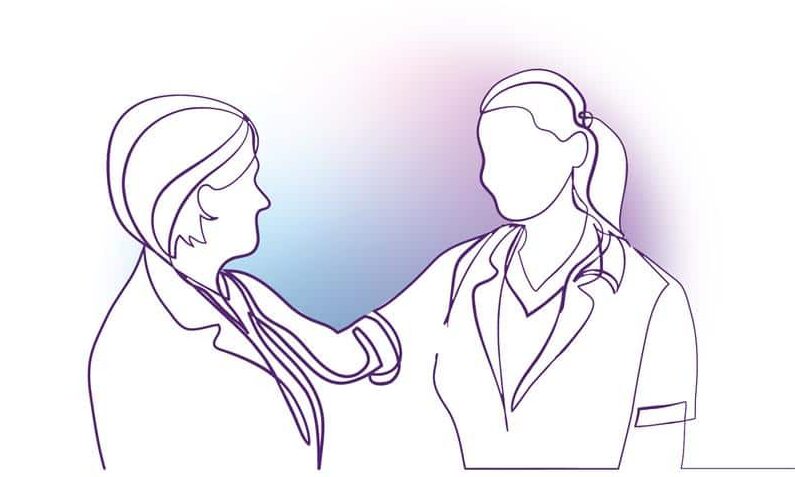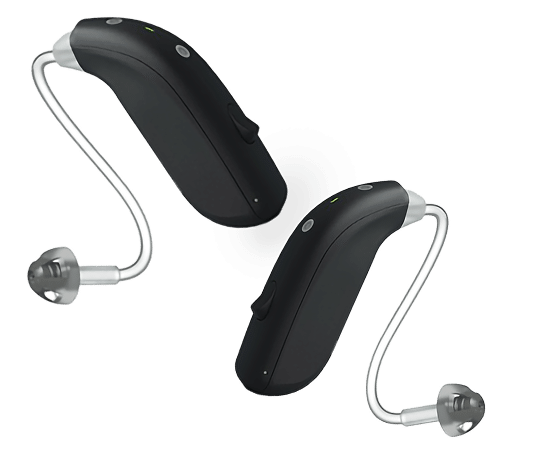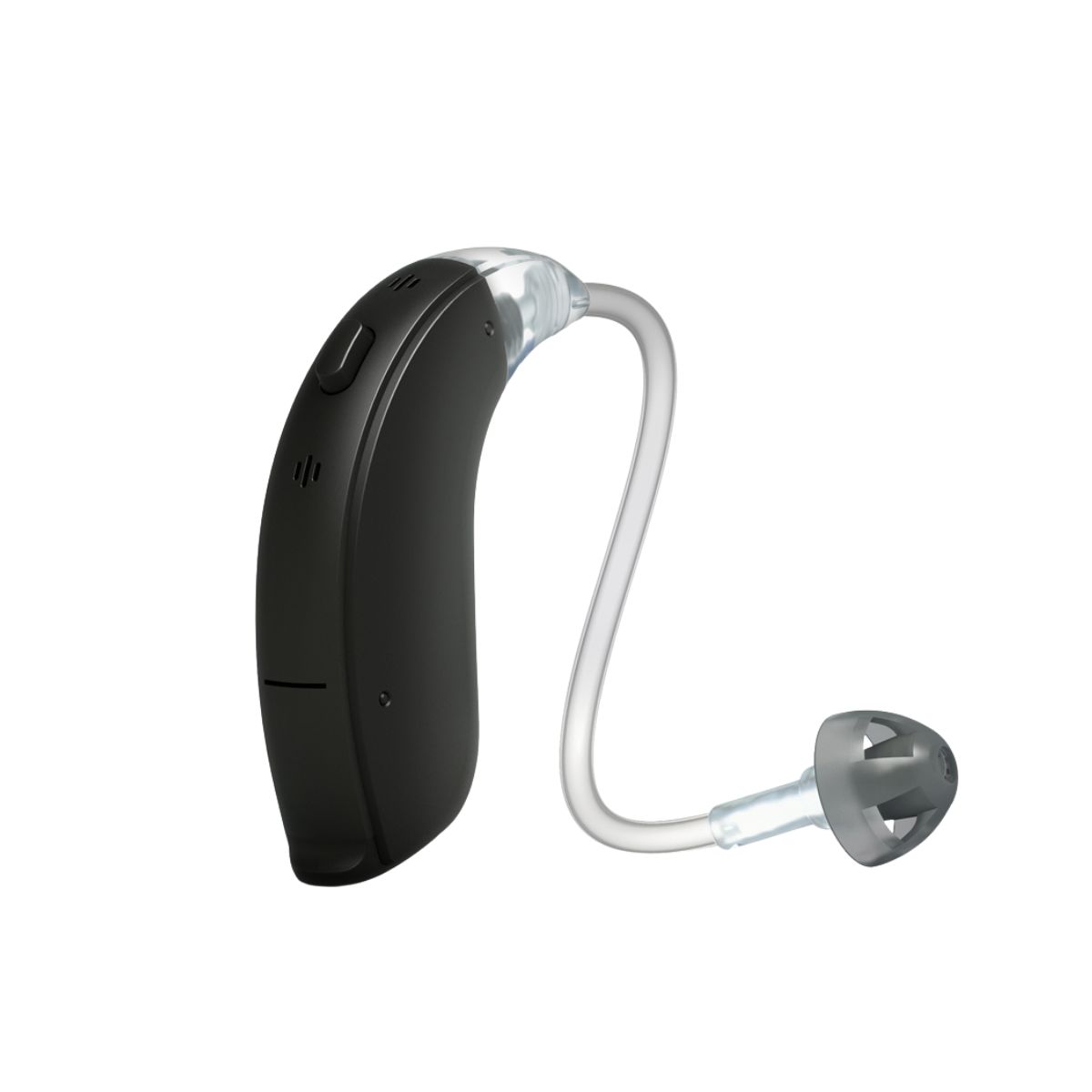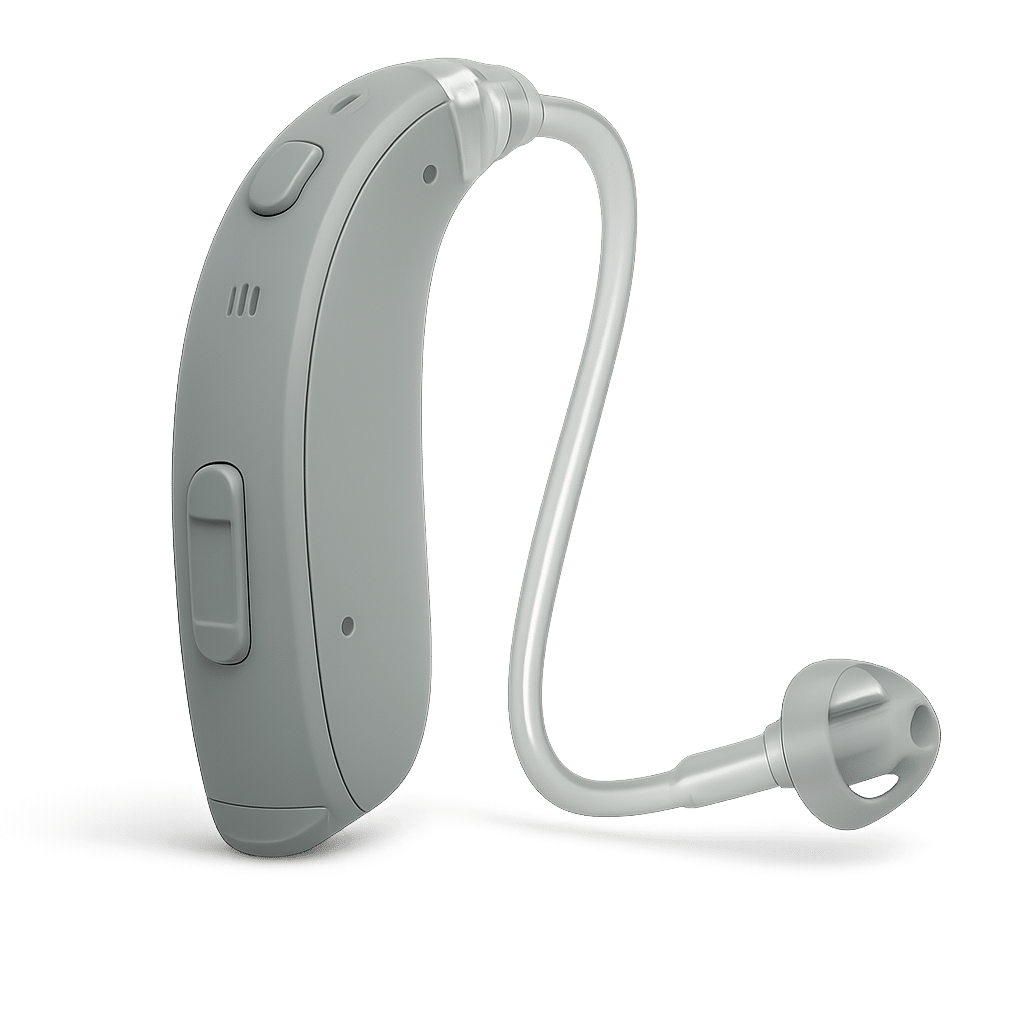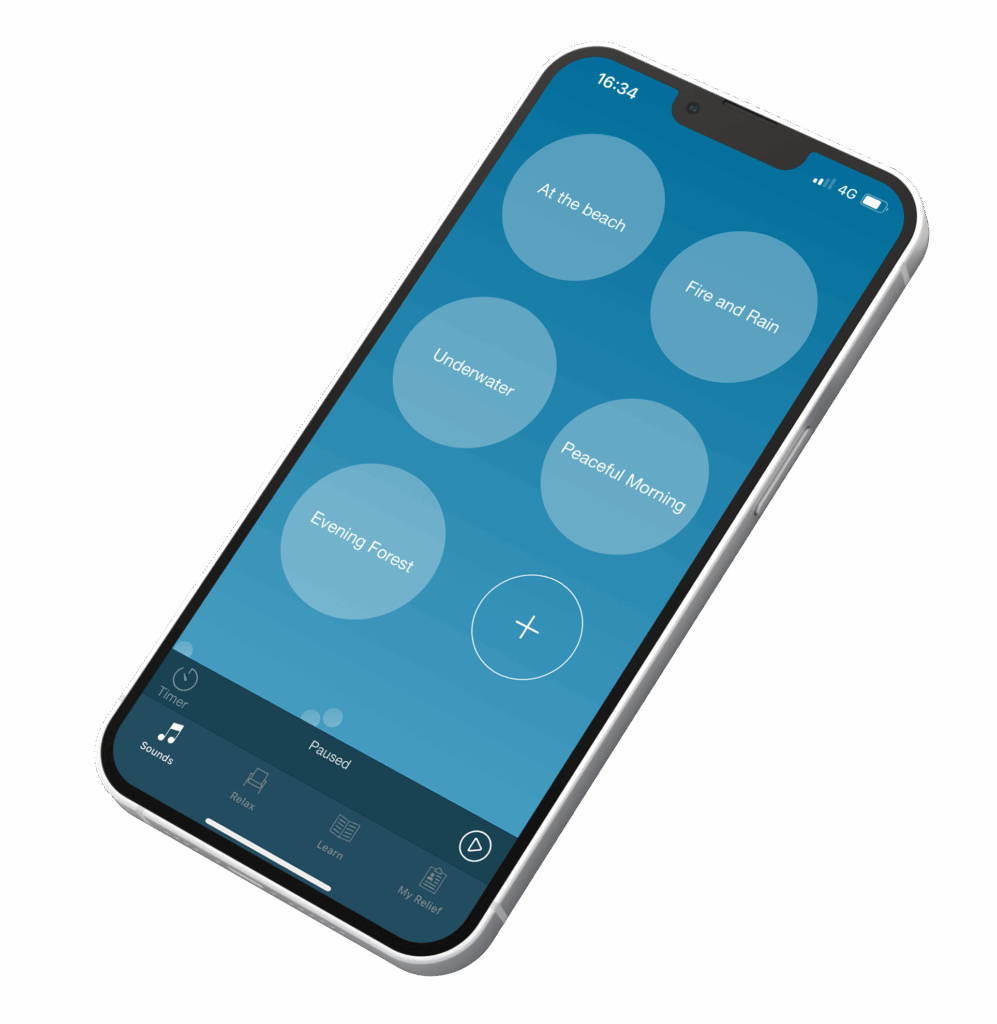Hearing loss and tinnitus
- Hearing loss is a common contributor to tinnitus British Tinnitus Association. Hearing aids and tinnitus. September 2019. Available at: https://www.tinnitus.org.uk/he… (accessed January 2022);
- Experts recommend trying hearing aids if you have tinnitus and a hearing loss Tunkel DC, et al. Otolaryngol Head Neck Surg. 2014;151(2):S1–40; Cima RFF, et al. HNO. 2019;67(1):10–42;
- How hearing aids relieve tinnitus is not fully understood, but there is strong scientific evidence that they provide relief Hoare DJ, et al. Cochrane Database Syst Rev. 2014;(1) doi:10.1002/14651858.CD010151.pub2;
- Some hearing aids have inbuilt ‘tinnitus sound generators’ (TSGs) that produce background or white noise to soothe tinnitus by giving your mind something else to focus on1
- To get help, contact your GP or Audiologist (if you are already under the care of an NHS Audiology Department) British Tinnitus Association. Is there a cure for tinnitus? June 2017. Available at: https://www.tinnitus.org.uk/FA… (accessed January 2022);
- All danalogic hearing aids have inbuilt TSGs, to help support people with tinnitus
Since tinnitus and hearing loss are sometimes linked, wearing a modern hearing aid for tinnitus can be an effective tinnitus treatment. Around 80% of people suffering from tinnitus also have hearing loss. British Tinnitus Association. Tinnitus and severe-profound hearing loss. August 2021. Available at: https://www.tinnitus.org.uk/ti… (accessed January 2022); If you have tinnitus and a hearing loss, however mild, hearing aids may provide relief. Sereda M, et al. Cochrane Database Syst Rev. 2018;(12) doi:10.1002/14651858.CD013094.pub2; Although hearing aids should not be considered a cure Searchfield GD, et al. Front Digit Health. 2021;3:724370; experts and the British Tinnitus Association recommend trying them. British Tinnitus Association. Tinnitus and hearing aids. April 2019. Available at: https://www.tinnitus.org.uk/Ha… (accessed January 2022);
To understand why hearing aids help to reduce tinnitus, we need to know that hearing loss is not only common in people with tinnitus, but it can also cause tinnitus. Haider HF, et al. Front Neurosci. 2018;12:866; Hearing loss changes the signals sent from the ear to the brain. British Tinnitus Association. All about tinnitus. July 2019. Available at: https://www.tinnitus.org.uk/Ha… (accessed January 2022); These changes can confuse the brain, making you think that you’re hearing a sound when there isn’t one there – tinnitus.
Hearing aids are an effective treatment for tinnitus as they help to restore normal communication between the ear and the brain. Although the exact mechanism behind this is not fully understood, for over 70 years hearing aids have been considered an effective way to relieve tinnitus. Jacquemin L, et al. Int J Audiol. 2021;1–9;
Living With Tinnitus
Read our Living With Tinnitus Guide to find out what might help relieve tinnitus, how to find reliable information and connect with others who also have tinnitus.
Download Living With Tinnitus Guide
Hearing aids relieve tinnitus
Hearing aids can help those with tinnitus who also have hearing loss. Hearing aids amplify sounds to help with hearing loss and the amplified sounds can help distract from tinnitus and make tinnitus less noticeable. Scientific evidence supports hearing aids for tinnitus treatment as they can help reduce: Kikidis D, et al. J Clin Med. 2021;10(13):2896; Zarenoe R, et al. J Am Acad Audiol. 2017;28(2):141–51;
By subtly amplifying natural background noises, hearing aids can make unpleasant tinnitus sounds less prominent. American Tinnitus Association. Hearing aids. Available at: https://www.ata.org/managing-y… (accessed January 2022); This can be anything from a cheerful bird song, to the ticking of a clock, or the whirl of a ceiling fan.
Hearing aids improve people’s emotional and mental wellbeing, including reducing depression and anxiety. Pascal JT and Yueh B. JAMA. 2012;307(11):1185–94; Ferguson MA, et al. Cochrane Database Syst Rev. 2017;9(9):CD012023; Yueh B, et al. JAMA. 2003;289(15):1976–85; Mahmoudi E, et al. J Am Geriatr Soc. 2019;67(11):2362–9; Evidence suggests that improving a depressed mood can reduce tinnitus severity. Hébert S, et al. PLoS One 2012;7(5):e37733; The benefit is self-perpetuating – as reducing tinnitus volume alleviates frustration/improves mood. American Tinnitus Association. Hearing aids. Available at: https://www.ata.org/managing-y… (accessed January 2022);
Although tinnitus doesn’t cause hearing loss, it can be distracting and make it hard to concentrate on things you want to hear. This may cause you to avoid socialising, for fear of mishearing or being unable to follow group conversations. Matthen M. Ear Hear. 2016;37:28–34; Hearing aids can help by making speech clearer, reducing the ‘effort’ of hearing Hornsby BWY. Ear Hear. 2013;34(5):523–34; – so you can get back to the life you remember before tinnitus.
Find freedom from tinnitus
If you have tinnitus, it is important to talk to your GP or Audiologist. British Tinnitus Association. Is there a cure for tinnitus? June 2017. Available at: https://www.tinnitus.org.uk/FA… (accessed January 2022); Audiologists have the necessary training and equipment to thoroughly assess your tinnitus, and to provide you with expert recommendations to help you find relief. Northern JL. Audiol Res. 2011.1(1):e20l; National Institute on Deafness and Other Communication Disorders. Hearing Aids. July 2015. Available at: https://www.nidcd.nih.gov/site… (accessed December 2021). As many people with tinnitus have some degree of hearing loss it’s a good idea to have your hearing checked also. Tunkel DC, et al. Otolaryngol Head Neck Surg. 2014;151(2):S1–40; British Tinnitus Association. All about tinnitus. July 2019. Available at: https://www.tinnitus.org.uk/Ha… (accessed January 2022);
If you have been diagnosed with tinnitus and a hearing loss, your Audiologist may recommend that you try wearing one or two NHS hearing aids. British Tinnitus Association. Is there a cure for tinnitus? June 2017. Available at: https://www.tinnitus.org.uk/FA… (accessed January 2022); All Danalogic GN NHS hearing aids have inbuilt sound generators, specifically designed to help relieve tinnitus, in addition to supporting hearing loss:
How can hearing aids help with tinnitus relief?
Sound therapy means external noises are brought in to help mask the troubling sounds of tinnitus. This could be white noise, specialised ear masking noises, low-level music or even your own customised sound. Think of a candle in a dark room. Since there’s such a contrast between the candle and its dark environment, the candle really stands out. But the same candle in a well-lit, busy room blends into the background. The same is true for tinnitus. The introduction of other sounds masks the tinnitus so that it blends in with the background and is less prominent.
Auditory stimulation can provide tinnitus relief for a short period of time. A great variety of sounds can be used, including music with different types of filtering, amplitude-modulated sounds with different frequencies, or various noise stimulations. If you don’t have special hearing aids for tinnitus masking, the Relief app offers a combination of sound therapy, relaxing exercises, meditation, and guidance, which can be streamed directly to your hearing aids. It can be used by all people suffering from tinnitus. If you don’t have hearing aids with Bluetooth technology, you can connect your smartphone or tablet to a headset and be on your way to a more comfortable life with tinnitus.
Loud tinnitus can make it difficult for people to participate in a conversation. The best hearing aids for tinnitus help by augmenting external sound above the perceived volume of tinnitus. Improving communication with one’s surroundings may help reduce symptoms of stress and anxiety often associated with auditory fatigue, having to listen intently throughout the day.
Some hearing aids include ‘sound generator’ programmes. You may hear these referred to as ‘combination’ hearing aids, as they have everything you need in a single, compact package. These combination hearing aids produce quiet background noises to soothe your tinnitus, by giving your mind something else to focus on.
Alongside hearing aids, there are several other tinnitus treatment options available to relieve tinnitus. These include sound therapy, counselling, and relaxation. But you don’t have to pick one approach – they can all be used to support you. Tinnitus management programs aim to teach the brain to be less distracted by tinnitus sounds, while learning to focus on other, more important things in life. Addressing stress with anti-anxiety measures like listening to soothing/calming sounds, exercise, and meditation can also be an effective form of tinnitus treatment. Because tinnitus is unique from person to person, it’s important to find the best hearing aids for tinnitus for you, as well as a treatment plan that is individualised to your personal needs.
Another option is the Relief app, which provides engaging activities and comprehensive tips for understanding and managing your tinnitus.
FAQs
Hearing aids for tinnitus can help decrease the effect of tinnitus by masking the sound with white noise. In the unlikely case you do experience your hearing aids for tinnitus making your tinnitus worse, it’s important that you consult your hearing care professional. Tinnitus is unique from person to person, but with help from your hearing care professional, you can find the right hearing aids for tinnitus to help manage your tinnitus symptoms.
Hearing aids for tinnitus masking can help alleviate tinnitus by masking the internal ringing. By amplifying natural environmental sounds, hearing aids for tinnitus can make the unpleasant ringing of tinnitus less prominent. Specially designed programs in hearing aids for tinnitus allow you to play various sounds that can also help you move your attention away from your tinnitus.
Hearing aids for tinnitus masking are not a cure for tinnitus, but they can help alleviate symptoms. Although your tinnitus may not go away entirely, there are many ways to take control of your tinnitus and reduce its impact on your life. A hearing care professional can help you manage your symptoms through education, counselling, and sound therapy.
The best hearing aids for tinnitus are designed to deliver relief from the ringing in your ears. By subtly amplifying background noise to help reduce the awareness of tinnitus, your brain can focus on the sounds you want to hear, instead of the sound of your tinnitus.
There’s no cure for most types of tinnitus, but there are tinnitus management options that can give you relief.
Are you an NHS Audiologist?
If you would like more information about Danalogic NHS hearing aids, wireless accessories and apps, or to book a demonstration, please get in touch. You can also explore our Professional Portal to access useful support materials.
Contact UsLooking for support?
If you are looking for support with your hearing aid, please visit our dedicated hearing aid support page, where you will find a wide range of documents and videos.
Hearing Aid support